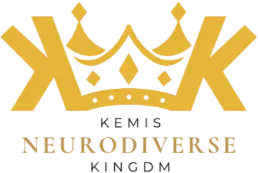ADHD Coaching: What It Is and How to Find the Right ADHD Coach
When ADHD is holding you back from achieving the life you want, the last thing you need is another “Just try harder” or “It’s not that difficult.”
You need a safe space to ask questions, explore challenges, and build practical solutions, not judgement. That’s where an ADHD coach comes in.
At Kemis Neurodiverse Kings, we believe coaching isn’t about pushing harder. It’s about equipping you with tools, strategies, and confidence so you can live fully as your authentic self.
What Is an ADHD Coach?
An ADHD coach is a professional who works with you to identify your challenges and create strategies that help you move forward. Unlike general life coaches, ADHD coaches understand the unique struggles of time-blindness, impulsivity, emotional regulation, and focus.
With coaching, you don’t just talk about problems, you work on action-based solutions. A coach helps you:
- Stay organised: Create systems for managing time, tasks, and responsibilities.
- Stay on track: Build routines, set goals, and maintain motivation.
- Manage emotions: Strengthen impulse control and self-confidence while finding healthier ways to deal with stress.
- Improve relationships: Enhance communication and strengthen personal and professional bonds.
For many, ADHD coaching is life-changing because it’s not just about getting things done, it’s about reclaiming a sense of calm, control, and connection.
ADHD Coach vs. Therapist
You may be wondering if you need a therapist instead of a coach. Both are valuable, but they serve different purposes.
- Therapists focus on the emotional and psychological aspects of ADHD. They can help with co-existing conditions such as anxiety or depression.
- ADHD Coaches focus on practical strategies, routines, systems, and tools you can use every day to improve your quality of life.
If you want emotional healing, therapy may be best. If you’re looking for structure and skills to manage ADHD in daily life, coaching is the way forward.
Benefits of ADHD Coaching for Adults
Working with an ADHD coach can help you:
- Improve time management and organisation
- Increase motivation and follow-through
- Strengthen communication and relationships
- Build healthier routines around sleep, diet, and exercise
- Gain better control of impulsivity and emotional reactions
- Develop financial management skills
- Understand how ADHD impacts your work and personal life
These improvements ripple out into your career, studies, and relationships, creating more balance and less overwhelm.
ADHD Coaching in the Workplace
Workplace challenges can feel magnified with ADHD. Coaching can help you:
- Understand how ADHD affects your performance
- Set realistic goals and stay accountable
- Explore reasonable workplace adjustments (such as flexible schedules or a quieter workspace)
- Identify and leverage your strengths to thrive at work
- Improve planning, prioritisation, and focus
Some ADHD coaches even collaborate with managers or supervisors, fostering better communication and greater awareness in the workplace.
How to Find the Right ADHD Coach
Because the coaching field isn’t strictly regulated, choosing a qualified coach is critical. Here’s a step-by-step process to help you find the right fit:
- Define Your Goals: Write down what you want from coaching. Do you want to break procrastination, manage time, or improve work performance?
- Note Preferred Qualities: Think about characteristics that matter to you in a coach (gender, cultural background, language, or personal ADHD experience).
- Research Credentials: Look for certifications from organisations such as the Professional Association for ADHD Coaches (PACC) or the International Coaching Federation (ICF).
- Make a Shortlist: Narrow down potential coaches and research their background.
- Set Up Introductory Calls: Arrange a consultation to see if you “click” with their style.
- Prepare Questions: Ask about their experience, methods, and success stories with ADHD clients.
- Evaluate the Fit: Choose someone who makes you feel supported, understood, and empowered.
The Kemis Neurodiverse Kings Approach
At Kemis Neurodiverse Kings, our ADHD coaching goes beyond generic strategies. We provide culturally aware, non-judgemental, and deeply supportive coaching tailored to Black men and other neurodiverse adults who deserve to feel empowered, understood, and capable of thriving.
We don’t believe ADHD should define your limits, it should simply guide the tools and support you need to unlock your potential.
Ready to Take the Next Step?
If you’ve been thinking, “I know I could do better if I just had the right tools,” ADHD coaching might be what you’ve been waiting for.
👉 Book a consultation with Kemis Neurodiverse Kings today and start building the life you want, with the structure and confidence you deserve.
Schedule Your Consultation Now
Frequently Asked Questions
1. How is ADHD coaching different from therapy or counselling?
ADHD coaching focuses on practical strategies, structure, and tools to help you manage daily life more effectively. Therapy or counselling, on the other hand, explores emotional and psychological aspects, including conditions such as anxiety or depression. Many people find that a combination of both works best.
2. Do ADHD coaches need to be medically qualified?
No. ADHD coaches are not medical professionals. Their role is to provide guidance, structure, and accountability rather than clinical treatment. However, many coaches have specialist training or certification from recognised organisations, which is worth considering when choosing a coach.
3. Can ADHD coaching help adults who were only diagnosed later in life?
Yes. Many adults discover they have ADHD later in life and find coaching particularly valuable. Coaching can help you create new systems, break long-standing habits, and develop strategies that work for your current stage of life.
4. Is ADHD coaching suitable for the workplace?
Absolutely. Workplace coaching can address challenges such as time management, prioritisation, communication, and focus. Some coaches even collaborate with employers to improve understanding and foster a more supportive work environment.
5. How long does ADHD coaching usually last?
There’s no one-size-fits-all answer. Some people work with a coach for a few months to build essential skills, while others continue long-term for ongoing support and accountability. The duration often depends on your goals and progress.
